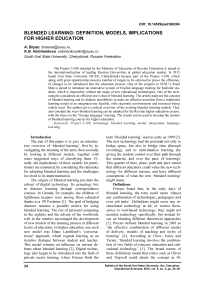Blended learning: definition, models, implications for higher education
Автор: Bryan A., Volchenkova K.N.
Рубрика: Теория и методика профессионального образования
Статья в выпуске: 2 т.8, 2016 года.
Бесплатный доступ
The Project 5-100 initiated by the Ministry of Education of Russian Federation is aimed at the internationalization of leading Russian Universities at global education market. In 2015 South Ural State University (SUSU, Chelyabinsk) became part of the Project 5-100, which along with great opportunities posed a number of targets to be achieved to prove the efficiency of changes to be introduced into the education process. One of the projects in SUSU’s Road Map is aimed to introduce an innovative system of English language training for bachelor students, which is impossible without the usage of new educational technologies. One of the technologies considered an efficient one is that of blended learning. The article analyzes the concept of blended learning and its didactic possibilities to make an effective transition from a traditional learning model to an integrated one feasible, with electronic environments and resources being widely used. The authors give a critical overview of the existing blended learning models. They also consider the ways blended learning can be adopted for the Russian higher education system, with the focus on the “foreign language” training. The results can be used to develop the models of blended learning courses for higher education.
Project 5-100, technology, blended learning, model, integration, language learning
Короткий адрес: https://sciup.org/147157799
IDR: 147157799 | DOI: 10.14529/ped160204
Список литературы Blended learning: definition, models, implications for higher education
- Barbour M. History of K-12 Online and Blended Instruction Worldwide’. Handbook of Research on K-12 Online and Blended Learning. N.P., ETC Press Publ., 2014, pp. 25-50.
- Heinze A., Procter C.T. Reflections on the Use of Blended Learning. Available at: usir.salford.ac.uk/1658/1/4247745025H__CP_-_paper9_5.pdf (accessed 17.03.2016).
- Friesen M. Report: Defining Blended Learning. Available at: http://blogs.ubc.ca/nfriesen/2012/09/01/where-does-blended-end-virtual-begin/(accessed 17.03.2016).
- Procter C.T. Blended Learning in Practice. Available at: www.ece.salford.ac.uk/proceedings/papers/cp_03.rtf (accessed 17.03.2016).
- Chew E., Jones N., Turner D. Critical Review of the Blended Learning Models Based on Maslow’s and Vygotsky’s Educational Theory’ in Hybrid Learning and Education. Berlin, Springer Verlag Publ., 2008, pp. 40-53. DOI: DOI: 10.1007/978-3-540-85170-7_4
- Oliver M., Trigwell K. Can Blended Learning Be Redeemed? E-Learning, 2005, no. 2(1), pp. 17-26. DOI: DOI: 10.2304/elea.2005.2.1.17
- Graham C.R. Blended Learning Systems: Definition, Current Trends, and Future Directions. The Handbook of Blended Learning: Global Perspectives, Local Designs. San Francisco, Pfeiffer Publ., 2006, pp. 3-21.
- Staker H., Horn M.B. Classifying K-12 Blended Learning. Available at: http://www. christenseninstitute.org/wp-content/uploads/2013/04/Classifying-K-12-blended-learning.pdf (accessed 17.03.2016).
- Hew K.F., Cheung W.S. Using Blended Learning: Evidence-Based Practices. London, Springer Publ., 2014. 123 p.
- Watson J., Murin A. A History of K-12 Online and Blended Instruction in the United States. Handbook of Research on K-12 Online and Blended Learning. N.P., ETC Press Publ., 2014, pp. 1-24.
- Krasnova T. A Paradigm Shift: Blended Learning Integration in Russian Higher Edu-cation. Procedia -Social and Behavioral Sciences, 2015, no. 166, pp. 399-403 DOI: 10.1016/j.sbspro.2014.12.543
- Stacey E., Gerbic P. Success Factors for Blended Learning. Available at: http://www. ascilite.org/conferences/melbourne08/procs/stacey. pdf (accessed 17.03.2016).
- Launer R. Five Assumptions on Blended Learning: What Is Important to Make Blended Learning a Successful Concept? Hybrid Learning. Berlin, Springer Verlag Publ., 2010, pp. 9-15 DOI: 10.1007/978-3-642-14657-2_2
- Valiathan P. Blended Learning Models. Available at: http://purnima-valiathan.com/wp-content/uploads/2015/09/Blended-Learning-Models-2002-ASTD.pdf (accessed 17.03.2016).
- Singh H. Building Effective Blended Learning Programs. Educational Technology, 2006, no. 43(6), pp. 51-54.
- Wenger E. Communities of Practice: a Brief Introduction. Available at: http://wenger-trayner.com/theory/(accessed 17.03.2016).
- Moskal P., Dziuban C., Hartman J. Blended Learning: A Dangerous Idea? Internet and Higher Education, 2013, no. 18, pp. 15-23 DOI: 10.1016/j.iheduc.2012.12.001
- Vaughan N.D. A Blended Community of Inquiry: Linking student and course redesign. Internet and Higher Education, 2009, no. 13, pp. 60-65 DOI: 10.1016/j.iheduc.2009.10.007
- Heinze A., Procter C.T. Reflections on the Use of Blended Learning. Available at: usir.salford.ac.uk/1658/1/4247745025H__CP_-_paper9_5.pdf (accessed 17.03.2016).
- Graham C.R., Dziuban C.D. Blended Learning Environments. Handbook of Research on Educational Communications and Technology. Mahwah, Lawrence Earlbaum Publ., 2008, pp. 269-276.
- Ellis C. You Can’t Do That in a Classroom!: How Distributed Learning Can Assist in the Widespread Adoption of Hybrid Learning Strategies. Hybrid Learning and Education: Proceedings of First International Conference. Berlin, Springer Verlag Publ., 2008, pp. 1-16 DOI: 10.1007/978-3-540-85170-7_1
- Ramage T.R. The “No Significant Difference” Phenomenon: A Literature Review. Available at: http://spark.parkland.edu/ramage_ pubs/1 (accessed 17.03.2016).
- WCET (WICHE Cooperative for Education Technologies). The No Significant Dif-ference Phenomenon. Available at: http://www.nosignificantdifference.org/(accessed 17.03.2016).
- Pells R. University Students are Struggling to Read Entire Books. Available at: http://www.independent.co.uk/news/education/university-students-are-struggling-to-read-entire-books-a6986361.html (accessed 17.03.2016).
- Furedi F. We Must Instil a Love of Reading in Students. Available at: https://www. timeshighereducation.com/opinion/we-must-instil-a-love-of-reading-in-students (accessed 17.03.2016).
- Means B., Toyama Y., Murphy R., Bakia M., Jones K. Evaluation of Evidence-Based Practices in Online Learning: A Meta-Analysis and Review of Online Learning Studies. Washington, US Department of Education Publ., 2010. 94 p.
- Lowes S. A Brief Look at the Metho-dologies Used in the Research on Online Tea-ching and Learning. Handbook of Research on K-12 Online and Blended Learning. N.P., ETC Press Publ., 2014, pp. 83-106.


